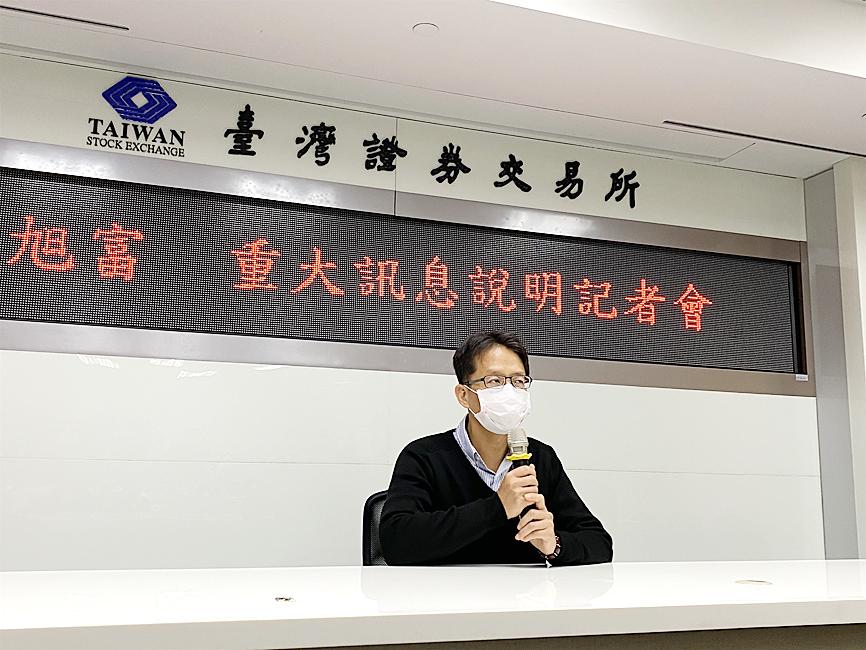Shares of drug developer SCI Pharmtech Inc (SCI, 旭富製藥) yesterday plunged by their daily limit to NT$112 after a fire broke out on Sunday at the company’s plant in Taoyuan’s Lujhu District (蘆竹), killing a Filipino worker and causing about NT$800 million (US$28.05 million) in losses.
The fire began at about noon when the production lines were processing chemical solutions, the Taoyuan-based company said.
Because of the chemicals stored in the plant and strong winds, sporadic explosions occurred and the blaze soon spread to the factories of four other companies.

Photo: CNA
Taoyuan firefighters said they expect to bring the fire under control this afternoon.
SCI Pharmtech spokesman Deiter Yang (楊文禎) told a news conference yesterday that a Filipino worker died early yesterday after being treated for third-degree burns covering 90 percent of his body.
Another employee, a Taiwanese man, was discharged from hospital after being treated for burns to his hand, Yang said.
The company estimated about NT$800 million in losses because of damage to its plant, but added that it should be able to obtain full compensation from insurance companies.
Still, it would take at least six months to rebuild the plant, as most production lines were damaged by the fire, it said.
It estimated another NT$600 million in lost orders in the first quarter, Yang said.
The company has about NT$250 million in finished products, but it needs to assess their quality after the fire, he added.
The Lujhu plant employs about 270 workers, who will all be paid in full up to the Lunar New Year holiday in February, Yang said.
As production has been suspended, the company would evaluate whether it needs to adopt furlough programs, he said.
The fire also damaged the factories of Tao Yuan Paper Manufacturing Co (桃園紙廠), Tung Yang Machine Industry Co (東陽精機), Gwo Chern Industrial Co (國晟工業) and Hong Li International Knitting Co (鴻利國際針織).
SCI Pharmtech is waiting for damage reports from the four before it could determine compensation, Yang said.
The company has NT$30 million in public liability insurance claims for damage to nearby factories, he added.
A subsidiary of local conglomerate Mercuries & Associates Ltd (三商行) and led by chairman Wong Wei-chyun (翁維駿), SCI Pharmtech produces active pharmaceutical ingredients (APIs), cannabidiol intermediates and specialty chemicals.
The company reported cumulative revenue of NT$2.61 billion in the first 11 months of this year, up 18.19 percent from NT$2.21 billion in the same period last year, thanks to steady shipments of APIs for hydroxychloroquine — a medicine used to treat or prevent malaria, lupus and rheumatoid arthritis, as well as mild cases of COVID-19 — and stable sales of other APIs used in drugs for treating epilepsy and depression.
Net profit in the first three quarters of this year was NT$638.92 million, compared with NT$481.6 million in the same period last year, or earnings per share of NT$8.04, compared with NT$6.06 a year earlier, company data showed.
As of yesterday, the company’s shares had risen 2.75 percent this year, underperforming the main bourse, which rose 19.9 percent, Taiwan Stock Exchange data showed.

NATIONAL SECURITY THREAT: An official said that Guan Guan’s comments had gone beyond the threshold of free speech, as she advocated for the destruction of the ROC China-born media influencer Guan Guan’s (關關) residency permit has been revoked for repeatedly posting pro-China content that threatens national security, the National Immigration Agency said yesterday. Guan Guan has said many controversial things in her videos posted to Douyin (抖音), including “the red flag will soon be painted all over Taiwan” and “Taiwan is an inseparable part of China,” while expressing hope for expedited “reunification.” The agency received multiple reports alleging that Guan Guan had advocated for armed reunification last year. After investigating, the agency last month issued a notice requiring her to appear and account for her actions. Guan Guan appeared as required,

A strong cold air mass is expected to arrive tonight, bringing a change in weather and a drop in temperature, the Central Weather Administration (CWA) said. The coldest time would be early on Thursday morning, with temperatures in some areas dipping as low as 8°C, it said. Daytime highs yesterday were 22°C to 24°C in northern and eastern Taiwan, and about 25°C to 28°C in the central and southern regions, it said. However, nighttime lows would dip to about 15°C to 16°C in central and northern Taiwan as well as the northeast, and 17°C to 19°C elsewhere, it said. Tropical Storm Nokaen, currently

‘NATO-PLUS’: ‘Our strategic partners in the Indo-Pacific are facing increasing aggression by the Chinese Communist Party,’ US Representative Rob Wittman said The US House of Representatives on Monday released its version of the Consolidated Appropriations Act, which includes US$1.15 billion to support security cooperation with Taiwan. The omnibus act, covering US$1.2 trillion of spending, allocates US$1 billion for the Taiwan Security Cooperation Initiative, as well as US$150 million for the replacement of defense articles and reimbursement of defense services provided to Taiwan. The fund allocations were based on the US National Defense Authorization Act for fiscal 2026 that was passed by the US Congress last month and authorized up to US$1 billion to the US Defense Security Cooperation Agency in support of the

PAPERS, PLEASE: The gang exploited the high value of the passports, selling them at inflated prices to Chinese buyers, who would treat them as ‘invisibility cloaks’ The Yilan District Court has handed four members of a syndicate prison terms ranging from one year and two months to two years and two months for their involvement in a scheme to purchase Taiwanese passports and resell them abroad at a massive markup. A Chinese human smuggling syndicate purchased Taiwanese passports through local criminal networks, exploiting the passports’ visa-free travel privileges to turn a profit of more than 20 times the original price, the court said. Such criminal organizations enable people to impersonate Taiwanese when entering and exiting Taiwan and other countries, undermining social order and the credibility of the nation’s